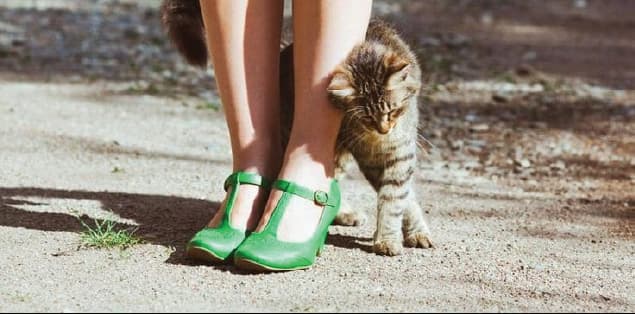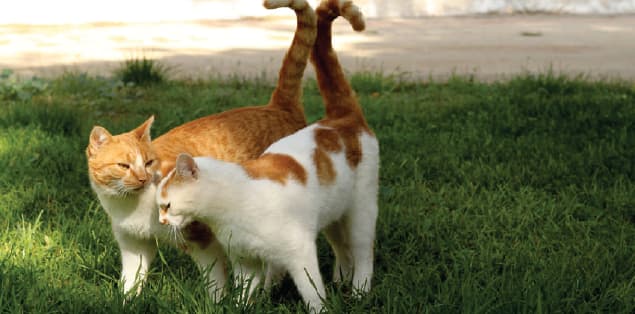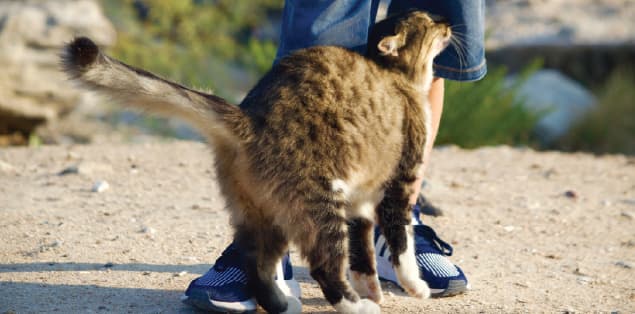The unexpected nuzzling of a kitty against us is something we look forward to every day, regardless of the time. We feel like we’re forming a loving relationship with our cat when it does this. But what is our feline companion thinking? Is it just the attention they’re getting from us that’s making them so happy? Why don’t they beg us to give them more treats if that’s the case? Why do cats rub against you in the first place?
So, if you want to know a little more about the behavior of your favorite kitty, you have come to the right place. Read on.
What Does It Mean When a Cat Rubs Against You?

According to Pet MD, rubbing against you or other objects is your cat’s way of relaying and disseminating information about the environment through her sense of smell. When your cat licks your face, she leaves behind her scent. In addition to the cheek, chin, forehead, and base of the tail on your cat’s body are scent glands. You can smell your cat if she rubs against you. To learn about their surroundings, cats rely primarily on their sense of smell.
Cats that know you well may leave a mark on your skin, but a new cat may rub against you in an attempt to learn more about you. For example, a well-acquainted cat may repeatedly mark you to ensure that her scent is left behind.
Why Do Cats Rub Against Your Legs?
Even though it may initially appear to be a loving tendency, it may be more aggressive than you first thought. That habit, according to PetPlace.com, is your cat’s way of claiming you as his own. He has glands on his face that produce pheromones, which he can transmit to humans, objects, and other cats to mark his territory the same way a dog does.
If your cat decides to rub against you, it tells other animals, “This human belongs to me!” Bonded relationships are known to exhibit this type of territorial behavior. Kitty sees you as just another cat, even though you’re taller than the rest. Figure-eights around your ankles will do for now, but he’d prefer a pat on the face instead.
As soon as you walk in the door, your cat is most likely trying to get your attention by rubbing up against your legs. Your cat may be hungry, but they may also want to play or be petted. This facial expression is known as bunting or head bunting and is used by cats to communicate that they’d like to be petted. When your cat rubs its face against yours, it’s asking for a pet or a head scratch. So, if your cat starts rubbing against your legs, reach out a hand to pet it. Your cat is likely rubbing against your legs and requesting that you pet them if their head bunts your hand when you hold it.
With rubbing, cats aren’t entirely territorial. At times, the smell of his scent is comforting. You smell like him gives him comfort in knowing that you’re one of his pack.
Why Do Cats Rub Against You Then Bite?
What a case of biting the hand that feeds you! Has your cat ever begged to be petted before biting or scratching you on the hand? It is known as “petting aggression,” and it is entirely normal, according to Amy Shojai, a certified animal behavior consultant. “This ‘leave me alone’ bite doesn’t mean he’s angry; it just means he wants to control the interaction, and too much petting overstimulates him,” she explains.
Cats must engage in predatory play regularly. They simulate their natural killing behavior by pouncing, grabbing, and biting. Sometimes the movement of your arm and leg brushing against them can trigger predatory play behavior as they rub against you.
Although it may sound a little crazy, one of the most common reasons a cat would do this is to show you, love. Believe it or not, some cats enjoy giving you a “love bite.” This kind of love bite is not meant to cause any harm and is simply a show of affection. Unusual, yes, but cats have a reputation for being out of the ordinary!
Why Do Cats Rub Against You When Hungry?
Nothing beats a cat rubbing up against a human when it comes to attracting attention. While we become familiar with our pets’ habits and peculiarities, our feline companions become adept at controlling us. It will be evident to the cat, who will know that rubbing usually results in a pat on the back or a treat.
Check the time when your cat rubs against you. You might have skipped a scheduled meal. Cats are creatures of habit, and if you’re a few minutes late feeding them, they’ll pick up on it. Cats may not wear wristwatches, but they can tell time using their internal clock.
The cat could be rubbing up against you because it wants you to play, pet or groom it. Watch how the cat reacts once it realizes that you’ve noticed it. The cat asks for food if it begins to meow or approaches its dish.
If this happens earlier than usual, especially during the winter, don’t be alarmed. During the colder months, cats are always more ravenous. In the fall and winter, the sun sets earlier. It indicates that the cat wants you to feed it sooner—your feline friend associates darkness with a meal in the evening.
Is Cat Rubbing Against You a Cause of Worry?
Cats are known for their skepticism when it comes to trusting humans. Cat and pet parent relationships can take months or years to mature to the point of mutual loyalty.
To understand your cat’s message, you’ll need to be familiar with feline body language. It is a cause of no concern if your cat rubs against you because it is an affectionate gesture of a loving cat. A cat rubbing against you is usually an excellent sign. It is frequently a greeting sign, indicating that your cat is pleased to see you. You may notice this more if you have been gone for a more extended period. Talk to your vet if your cat starts rubbing aggressively against your rugs, other objects, or even you, or if they show any other changes in attitude or behavior. It might even be a sign to clear out your litter box.
Keep an eye out for these unexpected signs of illness:
- Tilting the head
- Eye swiping
- Confusion
- Changes in eating or drinking habits
- Enhanced vocalization
- Loss of weight
- Vomiting
- Diarrhea
- Hair thinning
- Itching that ranges from mild to severe, or excessive grooming
Excessive rubbing can be caused by a variety of medical conditions (though your cat will almost always exhibit other clinical signs as well):
- Allergies
- Fleas
- Infections of the ears
- Intracranial ailment (tumors, infectious, or inflammatory causes)
- Feline hypersensitivity syndrome
If your cat is rubbing excessively or if you have any concerns about their behavior, make an appointment with a certified cat behavior consultant for an evaluation and possible testing.
Why Do Cats Rub Against Other Cats?

You’ve probably seen two of your feline neighbors rub up against each other if you live in a multicat household. They’ll butt heads and rub their entire bodies together. They’re saying “Hello” through scent communication. In the case of an unspayed female, she could be signaling that she is ready to mate.
Depositing Pheromones
On the outside of their mouths, temples, and tails, cats have scent glands that produce a variety of scents. For example, a cat is depositing and picking up its scent when scratching and rubbing against other feral cats. There are chemical compounds called pheromones in his scent that influence the behavior of the person who is smelling it. When he detects the smell of a friendly cat, he knows it’s a familiar one he can trust.
A Way of Greeting
Another reason cats rub against you is that it is their preferred method of greeting. Kittens commonly greet one another by rubbing the sides of their bodies and rubbing the corners of their mouths together. It is possible to see cats sniffing each other when passing around pheromones. Cats rely heavily on their sense of smell to know their surroundings. Cats leave their scent on everything and everyone in their territory, even their closest family and friends. Smell marking and friendly greeting are both accomplished by using the head butt.
When Kitty is in Heat
When a female cat is in heat, you may also see cats rubbing against each other. Unsexed female cats will let the male cats know they’re ready to mate when they are in heat. But, assuming it does, it will likely consider the lordosis position, which involves raising its back and slouching its tail out to the side.
She’ll also roll around on the floor, brushing up against her cats and human companions. Her yowling may be frequent, and she may also be distressed. She will display this behavior for many days until she mates around the age of six months. She will no longer exhibit the odd behavior that some people find troubling if she is spayed.
Final Words – Why Do Cats Rub Against You
Cats rub against you frequently because it is most likely attempting to claim you as theirs and gain your attention through pheromones. At the same time, your feline friend rubs against strangers to smell their pheromones and learn more about them.
Although this practice may appear bizarre, it is widespread throughout the animal kingdom. Even humans do it to some extent! It gives your furry friend all the information they need to understand one another and thrive in the cat social sphere.
That’s all there is to it! Cats are loving and complex creatures, and the reasons cats rub are due to a variety of factors. But the most important one, in this case, is that they adore you!
